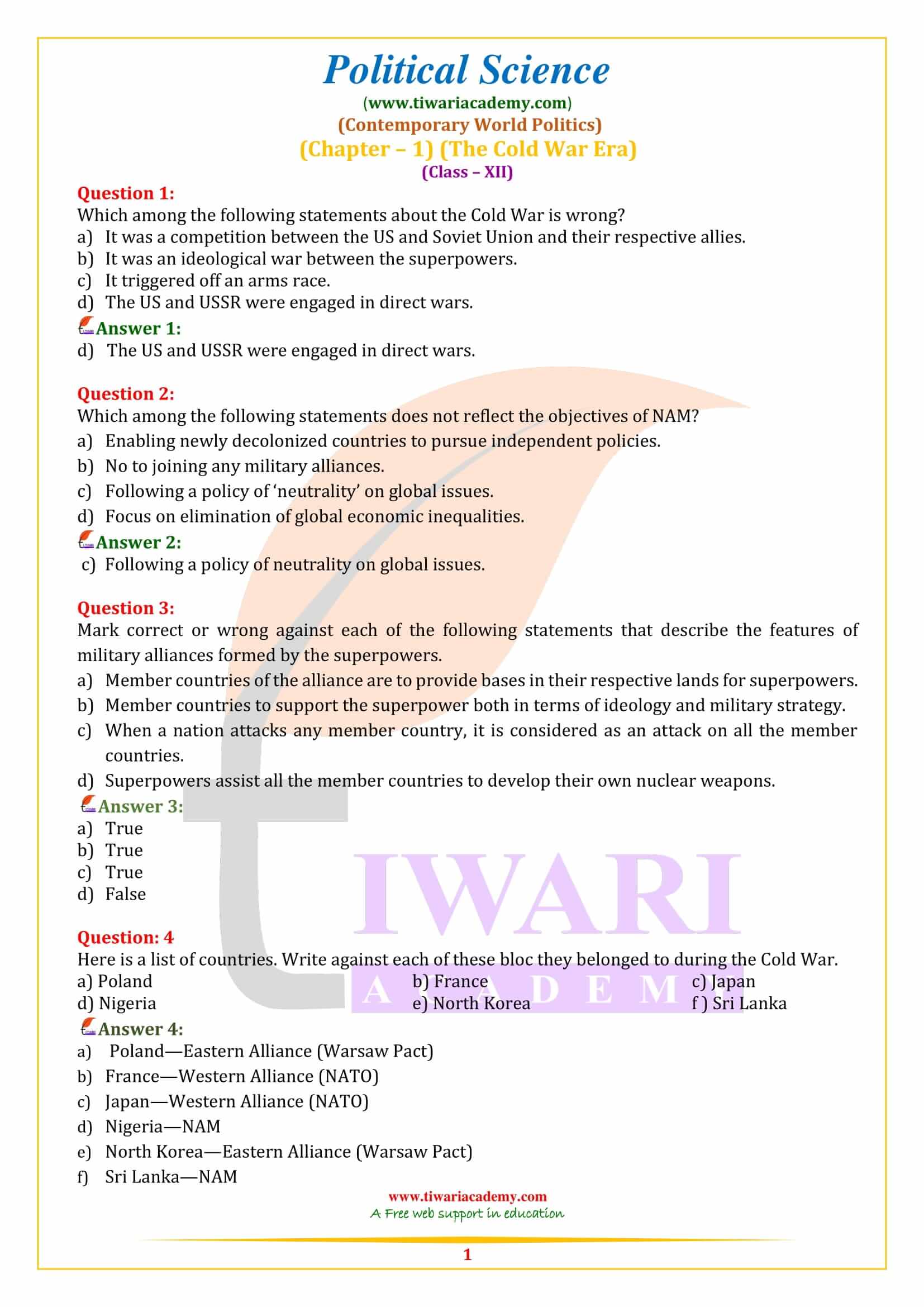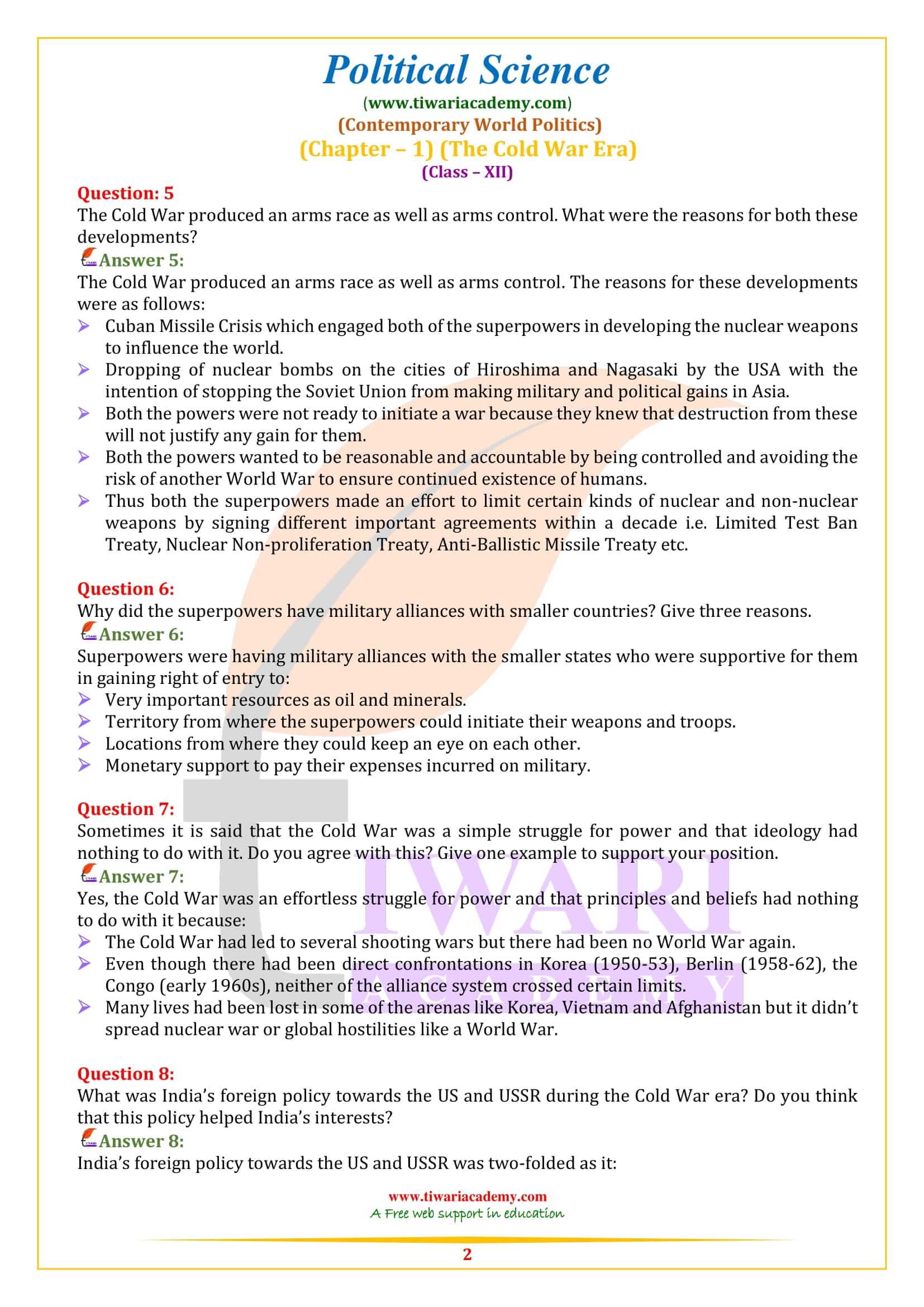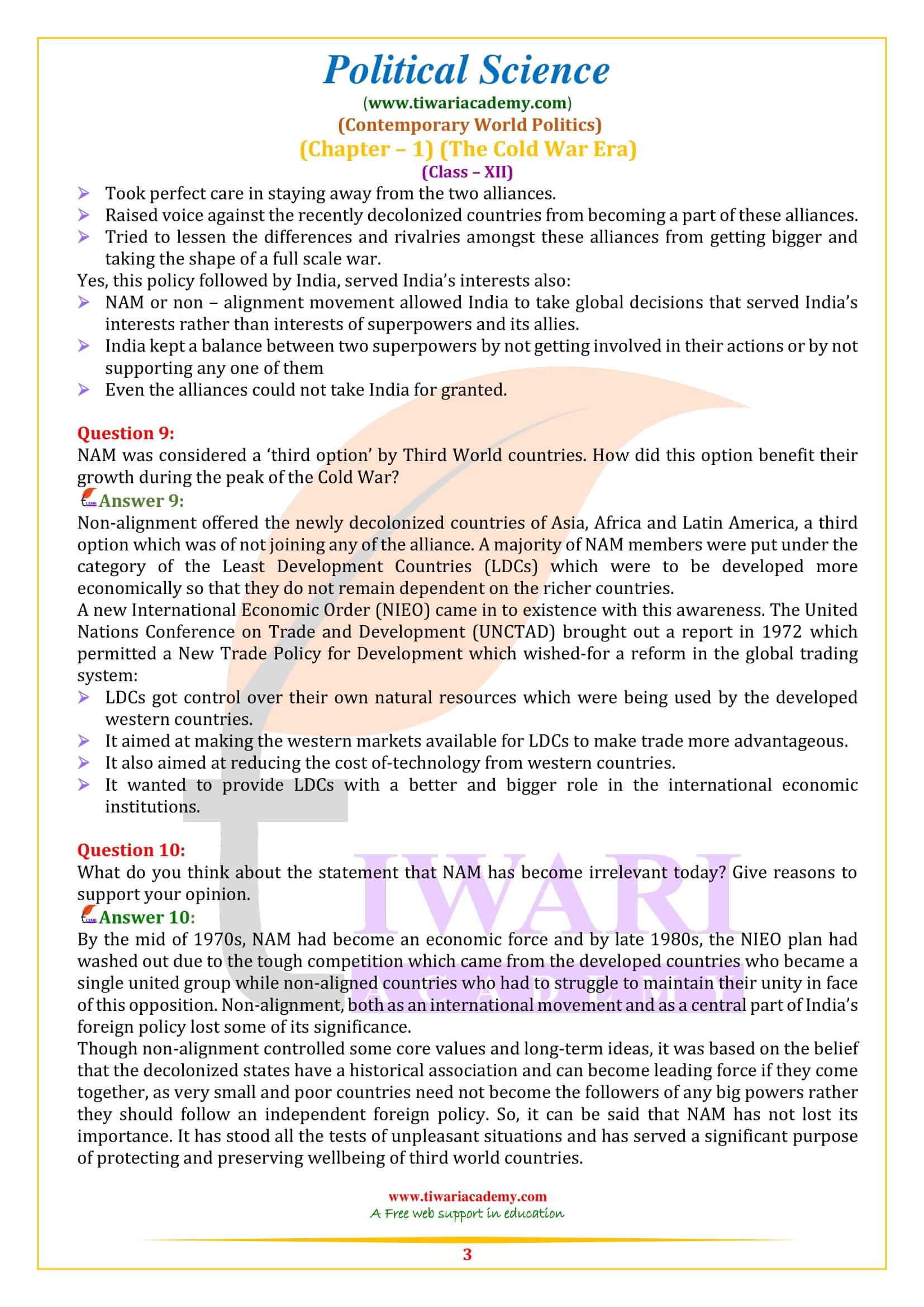NCERT Solutions for Class 12 Political Science Chapter 1 the Cold War Era updated for CBSE session 2024-25. All the questions given in Class 12 Political Science Part 1 Contemporary World Politics chapter 1 are solved with suitable explanation.
NCERT Solutions for Class 12 Political Science Chapter 1
Class 12 Political Science Chapter 1 MCQ
Which among the following statements about the Cold War is wrong?
Which among the following statements does not reflect the objectives of NAM?
The Cold War produced an arms race as well as arms control. What were the reasons for both these developments?
The Cold War produced an arms race as well as arms control. The reasons for these developments were as follows:
- Cuban Missile Crisis which engaged both of the superpowers in developing the nuclear weapons to influence the world.
- Dropping of nuclear bombs on the cities of Hiroshima and Nagasaki by the USA with the intention of stopping the Soviet Union from making military and political gains in Asia.
- Both the powers were not ready to initiate a war because they knew that destruction from these will not justify any gain for them.
- Both the powers wanted to be reasonable and accountable by being controlled and avoiding the risk of another World War to ensure continued existence of humans.
- Thus both the superpowers made an effort to limit certain kinds of nuclear and non-nuclear weapons by signing different important agreements within a decade i.e. Limited Test Ban Treaty, Nuclear Non-proliferation Treaty, Anti-Ballistic Missile Treaty etc.
Why did the superpowers have military alliances with smaller countries? Give three reasons.
Superpowers were having military alliances with the smaller states who were supportive for them in gaining right of entry to:
- Very important resources as oil and minerals.
- Territory from where the superpowers could initiate their weapons and troops.
- Locations from where they could keep an eye on each other.
- Monetary support to pay their expenses incurred on military.
Sometimes it is said that the Cold War was a simple struggle for power and that ideology had nothing to do with it. Do you agree with this? Give one example to support your position.
Yes, the Cold War was an effortless struggle for power and that principles and beliefs had nothing to do with it because:
- The Cold War had led to several shooting wars but there had been no World War again.
- Even though there had been direct confrontations in Korea (1950-53), Berlin (1958-62), the Congo (early 1960s), neither of the alliance system crossed certain limits.
- Many lives had been lost in some of the arenas like Korea, Vietnam and Afghanistan but it didn’t spread nuclear war or global hostilities like a World War.
What was India’s foreign policy towards the US and USSR during the Cold War era? Do you think that this policy helped India’s interests?
India’s foreign policy towards the US and USSR was two-folded as it:
- Took perfect care in staying away from the two alliances.
- Raised voice against the recently decolonized countries from becoming a part of these alliances.
- Tried to lessen the differences and rivalries amongst these alliances from getting bigger and taking the shape of a full scale war.
Yes, this policy followed by India, served India’s interests also:
- NAM or non – alignment movement allowed India to take global decisions that served India’s interests rather than interests of superpowers and its allies.
- India kept a balance between two superpowers by not getting involved in their actions or by not supporting any one of them
- Even the alliances could not take India for granted.
NAM was considered a ‘third option’ by Third World countries. How did this option benefit their growth during the peak of the Cold War?
Non-alignment offered the newly decolonized countries of Asia, Africa and Latin America, a third option which was of not joining any of the alliance. A majority of NAM members were put under the category of the Least Development Countries (LDCs) which were to be developed more economically so that they do not remain dependent on the richer countries.
A new International Economic Order (NIEO) came in to existence with this awareness. The United Nations Conference on Trade and Development (UNCTAD) brought out a report in 1972 which permitted a New Trade Policy for Development which wished-for a reform in the global trading system:
- LDCs got control over their own natural resources which were being used by the developed western countries.
- It aimed at making the western markets available for LDCs to make trade more advantageous.
- It also aimed at reducing the cost of-technology from western countries.
- It wanted to provide LDCs with a better and bigger role in the international economic institutions.
What do you think about the statement that NAM has become irrelevant today? Give reasons to support your opinion.
By the mid of 1970s, NAM had become an economic force and by late 1980s, the NIEO plan had washed out due to the tough competition which came from the developed countries who became a single united group while non-aligned countries who had to struggle to maintain their unity in face of this opposition. Non-alignment, both as an international movement and as a central part of India’s foreign policy lost some of its significance.
Though non-alignment controlled some core values and long-term ideas, it was based on the belief that the decolonized states have a historical association and can become leading force if they come together, as very small and poor countries need not become the followers of any big powers rather they should follow an independent foreign policy. So, it can be said that NAM has not lost its importance. It has stood all the tests of unpleasant situations and has served a significant purpose of protecting and preserving wellbeing of third world countries.





